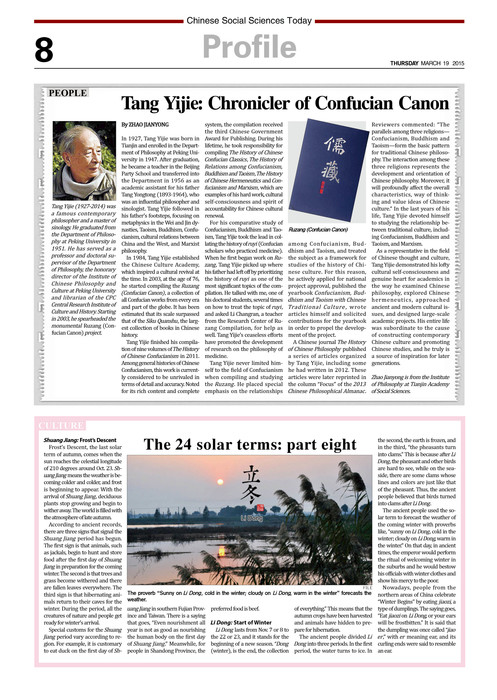Tang Yijie: Chronicler of Confucian Canon
2015-03-18 19:14:27
Ruzang (Confucian Canon)
Tang Yijie (1927-2014) was a famous contemporary philosopher and a master of sinology. He graduated from the Department of Philosophy at Peking University in 1951. He has served as a professor and doctoral supervisor of the Department of Philosophy, the honorary director of the Institute of Chinese Philosophy and Culture at Peking University and librarian of the CPC Central Research Institute of Culture and History. Starting in 2003, he spearheaded the monumental Ruzang (Confucian Canon) project.
By ZHAO JIANYONG
In 1927, Tang Yijie was born in Tianjin and enrolled in the Department of Philosophy at Peking University in 1947. After graduation, he became a teacher in the Beijing Party School and transferred into the Department in 1956 as an academic assistant for his father Tang Yongtong (1893-1964), who was an influential philosopher and sinologist. Tang Yijie followed in his father’s footsteps, focusing on metaphysics in the Wei and Jin dynasties, Taoism, Buddhism, Confucianism, cultural relations between China and the West, and Marxist philosophy.
In 1984, Tang Yijie established the Chinese Culture Academy, which inspired a cultural revival at the time. In 2003, at the age of 76, he started compiling the Ruzang (Confucian Canon), a collection of all Confucian works from every era and part of the globe. It has been estimated that its scale surpassed that of the Siku Quanshu, the largest collection of books in Chinese history.
Tang Yijie finished his compilation of nine volumes of The History of Chinese Confucianism in 2011. Among general histories of Chinese Confucianism, this work is currently considered to be unrivaled in terms of detail and accuracy. Noted for its rich content and complete system, the compilation received the third Chinese Government Award for Publishing. During his lifetime, he took responsibility for compiling The History of Chinese Confucian Classics, The History of Relations among Confucianism, Buddhism and Taoism, The History of Chinese Hermeneutics and Confucianism and Marxism, which are examples of his hard work, cultural self-consciousness and spirit of accountability for Chinese cultural renewal.
For his comparative study of Confucianism, Buddhism and Taoism, Tang Yijie took the lead in collating the history of ruyi (Confucian scholars who practiced medicine). When he first began work on Ruzang, Tang Yijie picked up where his father had left off by prioritizing the history of ruyi as one of the most significant topics of the compilation. He talked with me, one of his doctoral students, several times on how to treat the topic of ruyi, and asked Li Changran, a teacher from the Research Center of Ruzang Compilation, for help as well. Tang Yijie’s ceaseless efforts have promoted the development of research on the philosophy of medicine.
Tang Yijie never limited himself to the field of Confucianism when compiling and studying the Ruzang. He placed special emphasis on the relationships among Confucianism, Buddhism and Taoism, and treated the subject as a framework for studies of the history of Chinese culture. For this reason, he actively applied for national project approval, published the yearbook Confucianism, Buddhism and Taoism with Chinese Traditional Culture, wrote articles himself and solicited contributions for the yearbook in order to propel the development of the project.
A Chinese journal The History of Chinese Philosophy published a series of articles organized by Tang Yijie, including some he had written in 2012. These articles were later reprinted in the column “Focus” of the 2013 Chinese Philosophical Almanac. Reviewers commented: “The parallels among three religions—Confucianism, Buddhism and Taoism—form the basic pattern for traditional Chinese philosophy. The interaction among these three religions represents the development and orientation of Chinese philosophy. Moreover, it will profoundly affect the overall characteristics, way of thinking and value ideas of Chinese culture.” In the last years of his life, Tang Yijie devoted himself to studying the relationship between traditional culture, including Confucianism, Buddhism and Taoism, and Marxism.
As a representative in the field of Chinese thought and culture, Tang Yijie demonstrated his lofty cultural self-consciousness and genuine heart for academics in the way he examined Chinese philosophy, explored Chinese hermeneutics, approached ancient and modern cultural issues, and designed large-scale academic projects. His entire life was subordinate to the cause of constructing contemporary Chinese culture and promoting Chinese studies, and he truly is a source of inspiration for later generations.
Zhao Jianyong is from the Institute of Philosophy at Tianjin Academy of Social Sciences.


